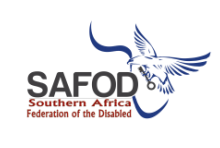The Southern Africa Federation of the Disabled (SAFOD) is a leading Southern African disability-focused network engaged in coordination of activities of Disabled Peoples Organizations (DPOs) in the Southern Africa region. The organization was formed in 1986 by persons with disabilities as a federation of DPOs with a strong presence in 10 countries. In each of these countries, we coordinate our programs and activities through our national affiliates, as follows:
1. Federation of ... Read More
The Southern Africa Federation of the Disabled (SAFOD) is a leading Southern African disability-focused network engaged in coordination of activities of Disabled Peoples Organizations (DPOs) in the Southern Africa region. The organization was formed in 1986 by persons with disabilities as a federation of DPOs with a strong presence in 10 countries. In each of these countries, we coordinate our programs and activities through our national affiliates, as follows:
1. Federation of Organizations of Disabled People in Angola (FAPED);
2. Botswana Federation of Disabled People (BOFOD);
3. Lesotho National Federation of the Disabled (LNFOD);
4. Federation of Disability Organisations in Malawi (FEDOMA);
5. Forum of Associations of Disabled People in Mozambique (FAMOD);
6. National Federation of People with Disabilities in Namibia (NFPDN);
7. Disabled People South Africa (DPSA);
8. Federation of Organisations of Disabled People in Swaziland (FODSWA);
9. Zambia Federation of Disabled (ZAFOD); and
10. Federation of Organisations of Disabled People in Zimbabwe (FODPZ).
In each of the 10 countries where we operate, our focus is mainly to strengthen the capacity of our affiliates so that they are able to effectively advocate for the rights of the persons with the disabilities in line with the UN Convention on the Rights of Persons with Disabilities (UNCRPD); lobby for inclusive policies and programs; and many other activities. SAFOD has successfully implemented activities and programs, delivering on its mission of strengthening DPOs in SAFOD member countries through training, research, coordination, information-sharing, promotion of human rights and stimulating persons with disabilities' political and social development.
In November 2014, SAFOD held the Strategic Planning Retreat in South Africa as part of a consultative process to seek input into the new five-year Strategic Plan for 2016-2020, which is currently under review in preparation for the new 2021-2025 Strategic Plan.
The consultative process in 2014 led to the identification of the eight core programs implemented under the Strategic Plan for 2016-2020, as follows:
1. Southern Africa Capacity and Institutional Building Strategy (SA-CIBIS)
2. Southern Africa Program on Inclusive Policies, Legislation and Justice (SA-IPLJ)
3. Southern Africa Disability Research, Documentation & Learning Centre (SA-DRDLC)
4. The Southern Africa Program on Inclusive Access to Health Care Services (SA-PAIHCARE)
5. Southern Africa Disability Economic Empowerment and Entrepreneurship Program (SA-DEEEP)
6. Southern Africa Disability and Gender Mainstreaming Program (SA-DGMP)
7. Southern Africa Inclusive Education Program (SA-IEP)
8. Southern Africa Development Program for Children and Youth with Disabilities (SA-DCYD)
SAFOD creates and holds a strategic niche as a Southern Africa organization of persons with disabilities championing their own rights. SAFOD is the first regional organization in Southern Africa bringing together ten national federations from ten different SADC member States having a coordinated focus on the human rights of persons with disabilities. As a regional umbrella organization, SAFOD supports national federations (affiliates) to take charge of their own issues and projects.
The engagements and work of SAFOD amplify the work of governments, partners and persons with disabilities by arguing for change in practices and policies with national governments and international institutions to support disability related human rights issues.
The changes SAFOD is able to collectively bring benefit others beyond people with disabilities, thus scaling up the impact of our work. In order to effect change, SAFOD engage critically with the Southern Africa Development Community (SADC), governments, and UN agencies whose policies and practices or lack of these are making persons with disabilities vulnerable and discriminated. Our tactics include providing research, evidence-based dialogues, promoting alternatives and running public education and sensitization and lobbying. As SAFOD seek wider change in the Southern Africa region, it also commit itself to remain guided by the agenda of persons with disabilities and their organizations and movements.
A critical part of our work involves using simple participatory techniques to engage with partners to explore issues of persons with disabilities. Articulating persons with disabilities own situation is a key step on the road to empowerment, developing solutions and effecting change for both persons with disabilities and wider society. Innovative and successful participatory approaches that SAFOD have developed by working with partners and organizations of persons with disabilities in countries and driving their participation in development related projects and in decision making are central in scaling up our work.
SAFOD work with its partners to strengthen persons with disabilities’ and their organizations’ skills, access to information and to enable joint actions. A crucial part of our work involves nurturing of National Federations of organizations of persons with disabilities. Delivering policy advocacy and programs is done in a manner that empowers persons with disabilities and their institutions to claim their rights and leverage support from the state. In this way, knowledge to the grassroots also enables persons with disabilities to address issues.
SAFOD enjoy the diversity of the stakeholders, partners, national governments, SADC and international partnership. Collaboration is absolutely fundamental to our approach. Working in this way enables us to maximize our contribution towards the rights of persons with disabilities and development while complementing the efforts of others. SAFOD rely on and draw on partners’ enormous resource base, deep knowledge of local conditions, customs and politics that it cannot match.
Hide Full Text